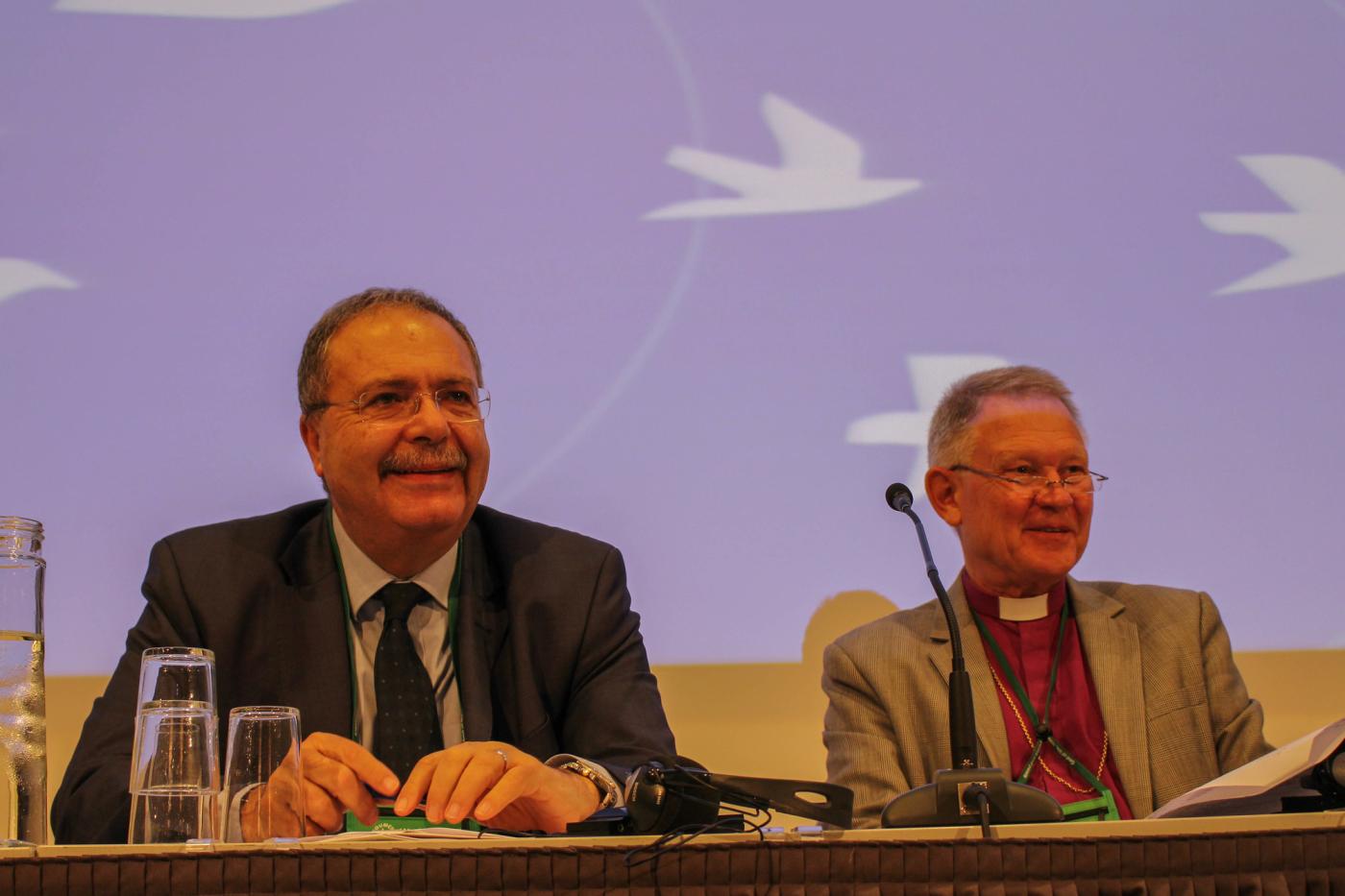War, ethnic conflict, millions of refugees and a deteriorating humanitarian situation provide a bleak background for discussion of the Middle East.
Yet it is too soon to surrender to disillusionment and fear, say several witnesses to the deadly drama being enacted there.
Realities of the Middle East formed the basis for plenary discussion on 25 June at the Central Committee meeting of the World Council of Churches (WCC) in Trondheim, Norway. The session was moderated by the WCC president for Europe, Swedish bishop Anders Wejryd.
Dr Tarek Mitri of the Greek Orthodox Patriarchate of Antioch, a professor at the American University, Beirut, said that the yearning for democracy that fueled the Arab Spring still lives deep in the embers scattered across the region, though perhaps not in the strongly Western models that Europeans and Americans envisioned.
Mitri acknowledges that struggles against formerly authoritarian regimeshave devolved into largely ethnic and religious conflicts in Syria and Iraq and Libya, or precipitated reassertion of authoritarian governance as in Egypt.
“Ethnic groups, and religious groups, are both actors and victims of identity politics” across the Arab world, says Mitri. “One has enough reasons to fear that many countries will continue to descend into disintegration, violence and chaos. However, there are changes at work that could…open the way for regeneration.”
Citing reverses in Syria and Iraq and Egypt, Libya and Palestine, Mitri agreed that “transition from authoritarian regimes to democracy has proved to be more arduous than anticipated.” And “the arduous road towards democratic transformation will not be achieved by adopting a presumably universal model of transition.”
Rather, he said, the focus should be on engendering a culture of inclusion, both interethnic and interreligious. “Christians possess the intellectual tools and the moral motivation” for such work and “the spiritual resources to resist the alarmism of war,”he said. The future of Christians and others in the Middle East depends on “the ability of all to rebuild states based on citizenship and the rule of law, while recognizing the wealth of religious and cultural plurality.”
The sad litany of Syria—perhaps half a million deaths, 14 million in need of humanitarian assistance, 6 million internally displaced and 5 million refugees—formed the backdrop of Hind About Kabawat’s presentation on “the ethical imperatives of the sensitive situation” in Syria. She is Conflict Resolution Program director at George Mason University.
“Despite this tragic situation,” she said, “there are still signs of hope and excellent peace building initiatives going on the ground.”While praising WCC engagement in the search for a nonmilitary solution and for interreligious engagement, she called on the churches to focus short-term on meeting real human need with humanitarian work and long-term on building educational and other local community institutions, creating signs of hope for the whole population. She also urged churches specifically to push for a real ceasefire, an end of sieges and “starvation as a weapon of war,” and the release of political prisoners.
Dr Muna Mushahwar, co-moderator of the Palestine Israel Ecumenical Forum, a WCC initiative, focused on the cycle of “occupation, humiliation and incarceration” in Gaza, Jerusalem and the West Bank. In the summer 2014 Israel-Gaza conflict, she said, 2,139 people were killed (including about 500 children), 11,000 were wounded, 500,000 people were displaced, and “Gaza became a heap of rubble.”
What can the churches do? Mushahwar, too, said Christians “should focus on the human beings” and their concrete need by working on schools and libraries and local initiatives, using their pilgrimages to the Holy Land to meet and work with the actual people there, following through on the framework of the Kairos Document, encouraging nonviolent resistance.
Mr Hany Fawzi of the Coptic Orthodox Church saw signs of hope, focusing on the role of millennials in Egypt during and since the revolution in 2011. With more than 40 percent of Egyptians under 40 years of age, he said, their use of social media not only pioneers new agencies for change; it also signals the arrival and importance of a new generation of activists in the Middle East. “Global networks of outrage and hope,” he said, “defending the same universal values and struggling against oppression,” presage long-term victory of inclusive governance, human rights and an openly pluralistic religious life.
More Information:








